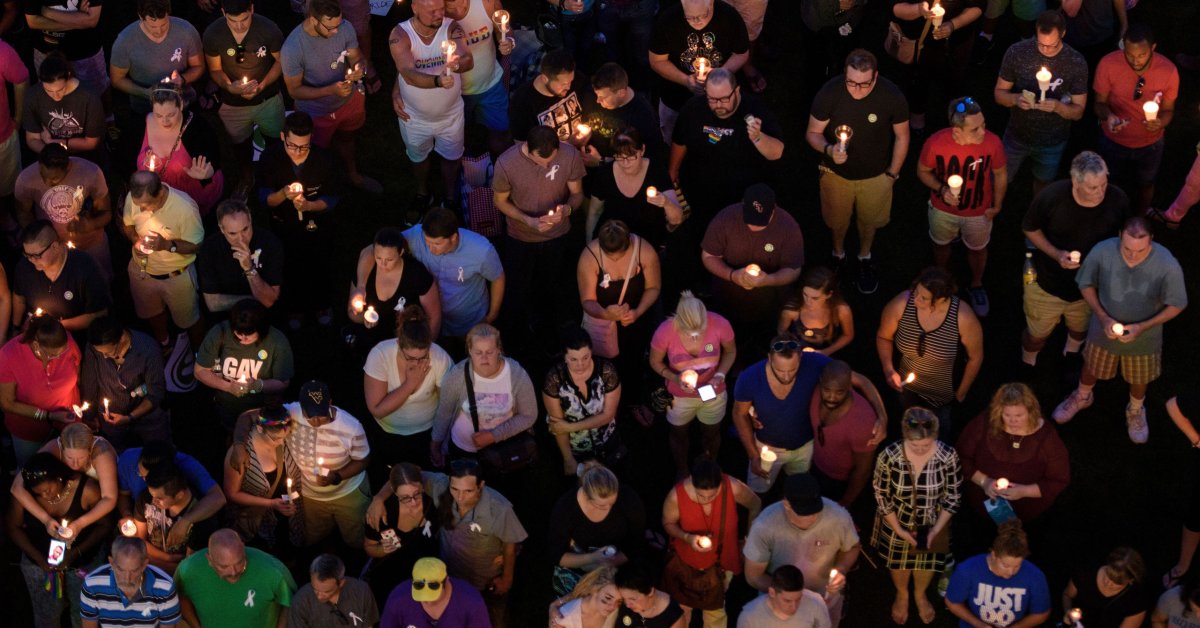
Growing up in rural Oregon, I often dreamt of a world where I could be all of myself. A world where I didn’t feel the nagging societal pressure to be “Black enough” for some spaces and “white enough” for others. A world that saw my queerness not as a dealbreaker, but as a superpower.
Pulse Nightclub embodied that for me. After packing two suitcases and running away to the refuge of Orlando, I uncovered what I had been looking for. The spinning disco balls and strobe beams ricocheting across the bar dared all of us to dance like no one was watching. The beats radiating from the floorboards unearthed our authenticity, nudging us into rhythmic protest against a world that had always told us to uncross our legs, stiffen our wrists, and deepen the gravel in our voices. There was safety there. Inside those walls, we were normal.
When I close my eyes at night, I can remember the moments when that normal shattered into a million shards on June 12, 2016. I can feel it, hear it, see it. The vibrant poster above the urinal. The cup teetering on the edge of the sink, perched precariously as if it might tumble to the tiles below. The first cracks of gunfire from an assault rifle. The stench of blood and smoke wafting into the room.
Hours later, the world woke to our horror: 49 dead; 53 injured. LGBTQ communities across the globe reeled with the jarring reminder that no space is a safe space when your very humanity is perpetually up for debate. The celebrations over marriage equality and surging social acceptance were suddenly cleaved by violence. Overnight, ours was a community under siege, picking up the broken pieces of the nation’s deadliest attack on LGBTQ people in history.
This community remains under siege today.
Florida, just years removed from that horrifying tragedy, has become synonymous with the breathtaking assaults on LGBTQ civil rights sweeping the nation. From book censorship to health care prohibitions on trans youth to bathroom bans, Gov. Ron DeSantis and his right wing allies have ushered in a raft of dehumanizing policies designed to build political careers at the expense of our civil liberties. These laws are all animated by the same dangerous ideology that has long been used to rationalize discrimination and violence against LGBTQ people: That we are a “contagion” whose “spread” can only be stopped by wielding the power of government to censor us out of society. This utterly absurd argument is peddled alongside promises to “protect the children” from us in an effort to force us back into that makeshift closet.
Read More: We’re Here, We’re Queer, We’re Getting Married in Florida
The demonization of LGBTQ people isn’t new. Whether it was the police raids that led to the Stonewall Riots or the HIV/AIDS crisis that fueled the ACT UP movement, this community has had its back against the wall countless times before. And at each pivotal point in history, we blazed a new path forward. We willed a better, more inclusive future into existence by sharing our stories unapologetically and choosing radical love over the ferocious hate threatening to consume us.
In the wake of the tragedy at Pulse seven years ago, Orlando faced a similar critical choice. We could succumb to the TV pundits. We could beat the drums of war. Or we could choose love. We could embody the spirit of Pulse itself, unapologetically becoming a city that dares everyone to dance as if no one is watching. We chose the latter. We chose love over hate.
When I left home in search of a place to belong, I didn’t expect to fall in love with a new community. I never thought I’d watch that community traverse the flames of militarized hatred. And I couldn’t have imagined that our struggle to put the pieces back together might demonstrate to a weary nation that when hate tries to demonize our neighbors, terrorize them into submission, and tear us apart at the seams, there is another path. We simply must choose to walk it together.
More Must-Reads From TIME














